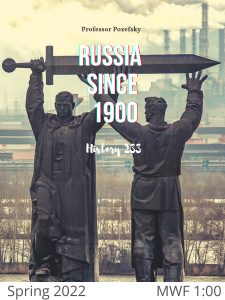
This course surveys Modern Russian history from the early twentieth century through the present day with attention to politics, society and culture. It will focus on the Bolshevik Revolution, the Stalin era, World War II and the rise of the Soviet Union as a superpower, the Cold War, the fall of the USSR and the rise of the new Russia under Boris Yeltsin and Vladimir Putin. The course will also explore big historiographic questions that have divided historians. It will present competing perspectives on the rise of the Bolsheviks, the attempt to create the world’s first socialist society, the nature of Stalinism, the collapse of Communism, the failure of liberal democracy in the 1990s and the emergence of authoritarianism under Putin. Moreover, the course uses these Russian issues to illuminate broader questions about the nature of historical inquiry, questions such as, what is history? How do historians employ primary sources to construct narratives and to formulate interpretations about the past? And finally, how might an understanding of history help us to understand the present and how might an understanding of a foreign culture help us understand our own cultures and societies. MWF 1:00